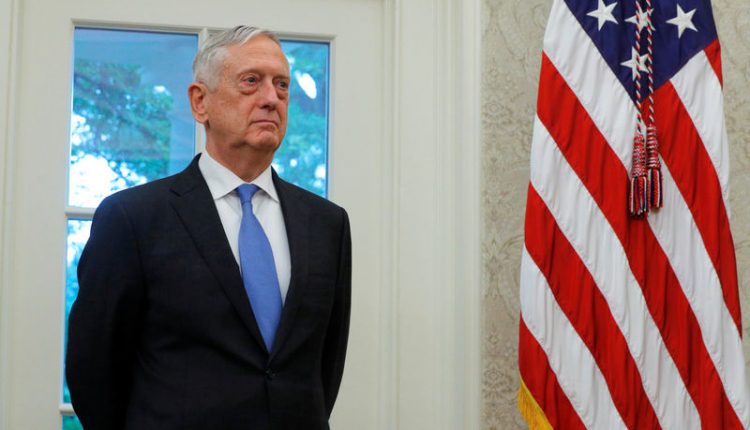Mattis dismisses Iran’s revenge threat as tensions climb after attack
U.S. Defense Secretary Jim Mattis on Monday dismissed Iran’s threats of revenge after Saturday’s deadly attack at a military parade in southwestern Iran and said it was “ludicrous” for Tehran to allege U.S. involvement.
Iran’s Supreme Leader Ayatollah Ali Khamenei said on Monday the attackers who killed 25 people at a military parade had been paid by Saudi Arabia and the United Arab Emirates, and that Iran would “severely punish” those behind the bloodshed.
The deputy head of Iran’s Revolutionary Guards also accused the United States and Israel of involvement in the attack and said they should expect a devastating response.
Mattis told reporters at the Pentagon that Iran’s threat did not give him any concern.
“We’ve been very clear that they shouldn’t take us on like that. And I am hopeful that cooler, wiser heads will prevail,” Mattis said.
“They’ve so far blamed at least three countries and I think one terrorist group. We’ll see how long the list goes. But it’d be good if they knew what they’re talking about before they started talking.”
In the southwestern city of Ahvaz, thousands packed the streets to mourn the victims of Saturday’s assault, many chanting “Death to Israel and America”. Twelve members of the elite Islamic Revolutionary Guard Corps were among the dead.
The coffins, wrapped in flags, were carried by mourners. Many held pictures of a four-year-old boy killed in the incident, one of the worst such attacks against Iran’s most powerful military force.
Iran’s Intelligence Ministry said some 22 people had been arrested in connection with the attack.
“Weapons, (explosives) material and communication equipment were seized in the house that belonged to the five-member terrorist group that carried out the attack,” a ministry statement said, according to the semi-official Tasnim news agency.
Gunmen fired on a viewing stand in Ahvaz where officials had gathered to watch an annual parade marking the start of Iran’s 1980-88 war with Iraq.
Fars and IRNA news agencies said on Monday five attackers were killed, not four as previously reported by state media. The body of the fifth assailant had not been identified as it was mixed up with other casualties, Fars said.
“Based on reports, this cowardly act was done by people who the Americans come to help when they are trapped in Syria and Iraq, and are paid by Saudi Arabia and the UAE,” Khamenei said on his website.
Guards Brigadier General Hossein Salami, in a speech broadcast on state TV, said: “You have seen our revenge before. You will see that our response will be crushing and devastating and you will regret what you have done.”
Tasnim news agency quoted Salami as saying the “horrific crime” exposed the dark side of an alliance that the United States, Saudi Arabia and Israel had created to counter Iranian influence in the region.
The secretary of Iran’s National Security Council said Tehran needed to talk to its neighbors to avoid tensions.
“It’s essential to be fully aware and increase our constructive dialogues to neutralize the plots of enemies who want to create suspicion and disagreement among regional countries,” Ali Shamkhani said.
He also said U.S. sanctions against Iran were illegal and President Donald Trump was using them as a tool for “personal revenge”.
MATTIS “WOKEN UP” BY NEWS
Mattis said it was clear that Iran still didn’t know what had happened. He stressed the United States had no advance knowledge that such an attack was possible.
“I don’t get woken up with phone calls over something we know is going to happen. It’s just ludicrous to say we had anything to do with it,” he said. U.S. Secretary of State Mike Pompeo, asked by a Fox News interviewer if the United States played any role in the attack, said: “When you have a security incident at home, blaming others is an enormous mistake.”
The loss of innocent lives was tragic, Pompeo added. There has been no reaction from Saudi Arabia or Israel.
Accusations against Gulf countries will almost certainly antagonize Iran’s regional foe Saudi Arabia. The oil super-powers are waging a war for influence across the Middle East, backing opposite sides in Syria, Yemen, Iraq and Lebanon.
It is, however, highly unlikely the Guards will strike any of its foes directly and risk setting off a regional conflict.
Analysts said the violence has led to a boost in domestic support for the Guards which they could use to silence their critics, who include pragmatic President Hassan Rouhani.
Rouhani engineered Iran’s 2015 nuclear deal with world powers that ushered in a cautious detente with Washington before tensions flared anew with Trump’s decision in May to pull out of the accord and reimpose sanctions on Tehran.
Iran’s Intelligence Minister, Mahmoud Alavi, said a network of suspects had been arrested in connection with the attack, the judiciary’s news agency Mizan reported. He did not elaborate.
Karim Dahimi, a human rights activist in London, told Reuters local sources had said more than 300 people had been arrested in the cities of Ahvaz, Khorramshahr and Abadan in recent days, mostly from the Sunni Muslim community.
Ahvaz National Resistance, an Iranian ethnic Arab opposition movement which seeks a separate state in oil-rich Khuzestan province, and Islamic State have both claimed responsibility.
The Guard Corps was set up after the 1979 Islamic revolution to protect the Shi’ite clerical ruling system and revolutionary values. It answers to Ayatollah Khamenei and has an estimated 125,000-strong military with army, navy and air units.
source: Reuters


